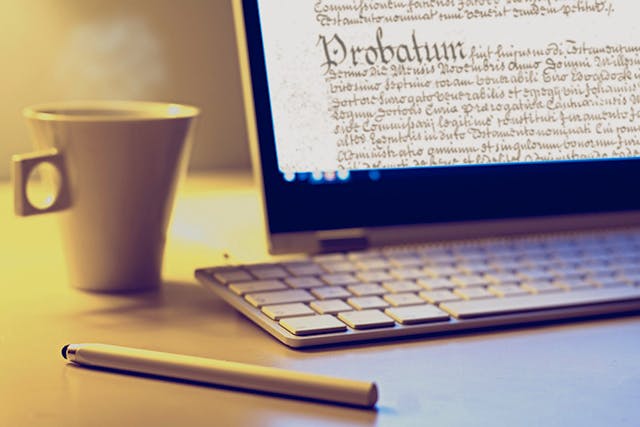How to search for your military ancestors
Introduction
We all have military ancestors, and we all have questions about them, which is why the SoG’s Gold Membership includes a monthly Armed Forces Advice Hour. Led by Graham Bandy, an expert military historian and British Army veteran, we find our members learn so much just from listening to the answers raised by other people’s questions. Luckily for you, we’re sharing some of the answers to questions raised in our recent sessions. Bookmark this page for the next time you have military, naval or RAF ancestor questions!
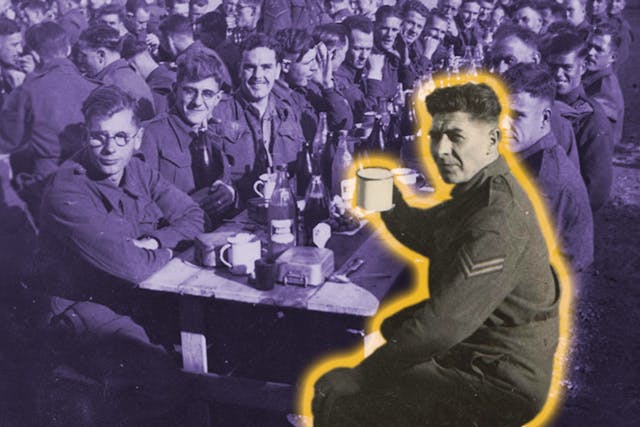
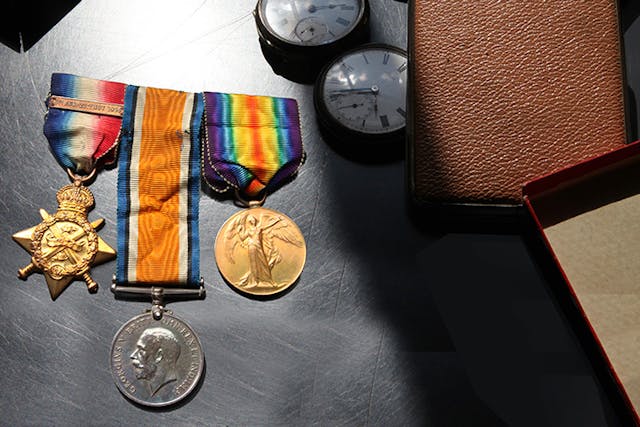
Medals and ephemera from the SoG’s Inman collection
1. How can I identify WWI war medals?
- Identifying surviving medals, or photographs of them can provide precious clues about your military ancestors. Learn more about medals and their significance by consulting resources on military decorations and honours. British First World War Service Medals were awarded based on specific criteria, such as serving in particular areas for a set duration. There were six types of service medals, including the 1914 Star, 1914-1915 Star, British War Medal, Allied Victory Medal, Territorial Force War Medal, and Mercantile Marine War Medal. These medals commemorated service during the war, with criteria varying for each. Medals were often nicknamed, and records of recipients were meticulously kept, which is helpful for your family history research. Service in the Royal Navy or Royal Flying Corps also had specific medal records.
DYK? "Pip, Squeak, and Wilfred" were nicknames given to three main campaign medals from the First World War: the 1914 Star (or 1914-15 Star), the British War Medal, and the Victory Medal, respectively. These nicknames originated from a popular comic strip in the Daily Mirror newspaper during the 1920s, featuring characters named Pip the dog, Squeak the penguin, and Wilfred the rabbit.
For further details on WWI medals, including where to search medal rolls, check out the following sites: The Great War 1914–1918, The Long, Long Trail, The National Archives (TNA) introductory guide to campaign service medals and an explanation of First World War Medal Index cards.
- Consider attending our new Armed Forces Advice Hour with our military expert, veteran British Army Officer Graham Bandy, for personalised guidance on identifying specific war medals.
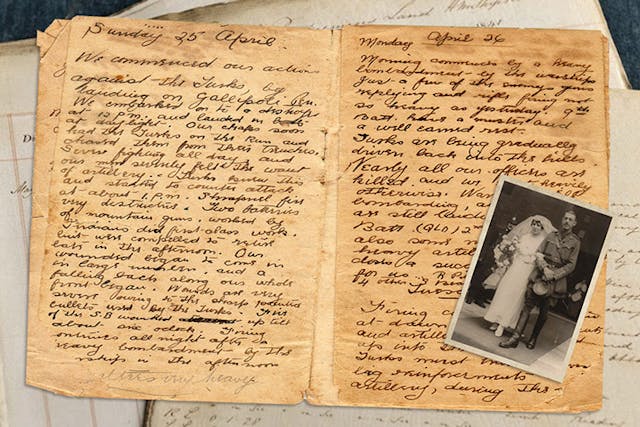
2. I know my ancestor's regiment. How can I find out where the regiment was and what they were doing?
- Muster Rolls and War Diaries are invaluable resources. Muster Rolls provide lists of personnel within military units, while War Diaries offer detailed accounts of their activities and locations. In the UK, family historians can find muster rolls and war diaries primarily at TNA in Kew. TNA holds extensive collections of military records, including digitized versions accessible both in-person and online through their website. Additionally, subscription websites like Ancestry and FindMyPast provide access to these records. Local archives, libraries, military museums, and regimental archives may also have relevant materials. Family history societies and online forums can offer guidance and assistance in accessing these resources, ensuring comprehensive research for those tracing their military ancestors in the UK.
DYK? - A muster roll is used in military contexts to record the names and details of individuals serving in a military unit, such as a regiment, company, or ship. These rolls were typically created regularly, often monthly, quarterly, or annually, to account for personnel within the unit. Muster rolls typically include information such as the names of soldiers or sailors, their ranks, enlistment dates, periods of service, and sometimes details about pay or equipment issued. These documents served administrative purposes for the armed forces, but today are valuable resources for historians and genealogists researching military personnel, as they offer insights into individual service histories and the composition of military units during specific periods.
3. What resources can I use to find out about the day-to-day operational activities of units?
- Research War Diaries and Unit Histories to uncover detailed accounts of military units' day-to-day activities and operations. Use these to learn more about the activities your military ancestors engaged in, where they served and when. Check out this helpful page from the Imperial War Museum for more details on the records you might find and where they might be held.
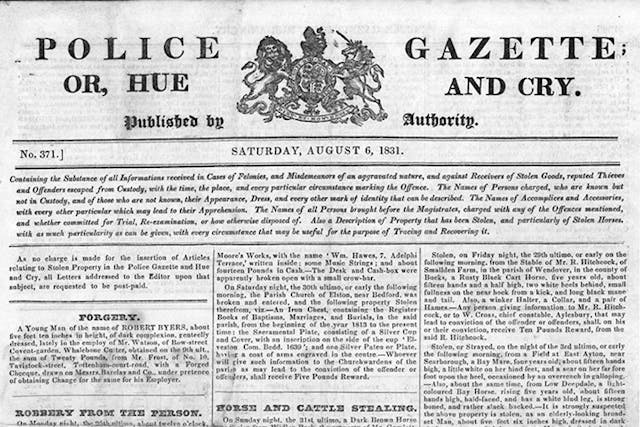
4. Family legend tells me that my military ancestor was a deserter. Aside from service records, how can I find out if this is true?
- Explore resources like Police Gazettes and newspapers (remember, not all are available online) for mentions of desertion or related incidents.
- Court Martial records and civilian jail records may also shed light on the circumstances surrounding desertion accusations. The National Archives holds a significant collection of court-martial records, while local archives and record offices may have documents specific to their local areas. Former prisons converted into museums or historical sites may also contain relevant archives. Online databases like FindMyPast and Ancestry offer digitised collections, and specialist organizations like SoG can provide guidance.
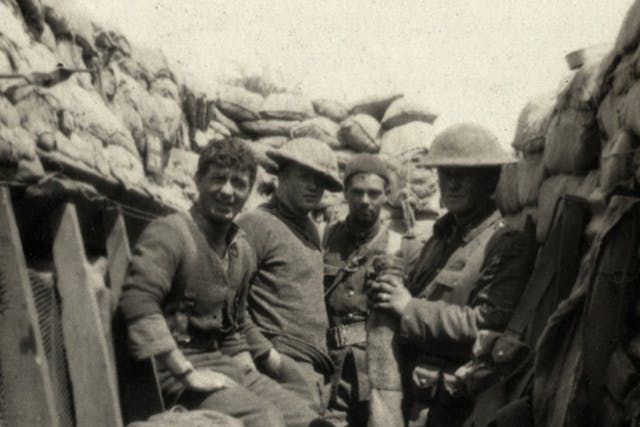
5. Where can I learn more about military ranks and what they mean? For example, what was a 2nd Corporal, and was this common to all regiments?
- A 2nd Corporal was a historical rank within the Royal Engineers and Army Ordnance Corps of the British Army. Second Corporals held full non-commissioned officer status, the rank being equivalent to bombardiers in the Royal Artillery. It was discontinued in 1920. Useful to know if you want to narrow down when your military ancestor was serving!
- To learn about military ranks and what they signify, you can consult various sources. Official military websites of the British Army, Royal Navy, and Royal Air Force provide detailed information on ranks, including their insignia, roles, and progression criteria. See the SoG library for manuals, books, and publications relating to military history. Museums such as the Imperial War Museum, National Army Museum, regimental museums and libraries dedicated to military history are further useful resources. Speaking with current or former military personnel, such as our expert Graham Bandy, can also provide valuable firsthand insights into the meaning and significance of these ranks.
6. Why are Royal Engineers named Sappers?
- The term "Sapper" originates from the French word "sapeur," which refers to military engineers involved in siege warfare, particularly in digging trenches or sapping enemy fortifications. Find out more about nicknames using military history books, online forums, regimental museums, veterans, and historical records. Common nicknames include "Tommy" for a British soldier, "Redcap" for Royal Military Police, "Para" for paratroopers, "Tankie" for armoured regiment soldiers, "Gunner" for artillery unit members, "Craftie" for REME craftsmen, and "Infanteer" for infantry soldiers. These nicknames reflect the unique roles and traditions of different units within the British Army, but there are many more variations used.
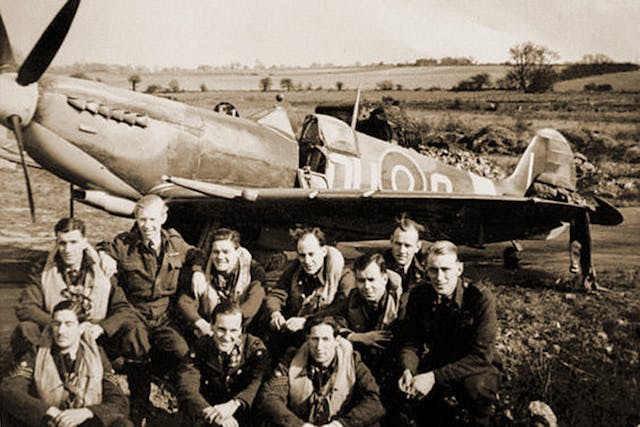
7. What was the Royal Flying Corps, and what was its role?
- The Royal Flying Corps (RFC) was a precursor to the Royal Air Force (RAF) and was responsible for aerial warfare during World War I. Find more information on the Royal Air Force Museum's official website, which offers a dedicated section on the RFC. This section provides historical overviews, photographs, documents, and personal stories related to the RFC's operations, aircraft, and personnel during World War I. It’s a treasure trove for those military ancestors in the RAF or RFC. The Imperial War Museum’s site also contains valuable resources and archives related to the RFC and its contributions to aerial warfare in World War I.
8. What's the difference between the Royal Navy and the Merchant Navy?
- the Royal Navy is responsible for military operations, while the Merchant Navy handles commercial shipping. The Royal Navy and Merchant Navy produce numerous records detailing their activities and personnel. These records, including ship logs, crew lists, and service records, are essential for understanding maritime history and tracing ancestors who served at sea. For those interested in exploring these records, resources like Tracing Your Naval Ancestors by Simon Fowler and Tracing Your Merchant Navy Ancestors by Simon Wills offer practical guidance. Additionally, websites such as The National Archives Discovery and the Maritime History Archive provide access to digitised records and resources for maritime research, making it easier to delve into the rich history of your Royal Navy and Merchant Navy ancestors.
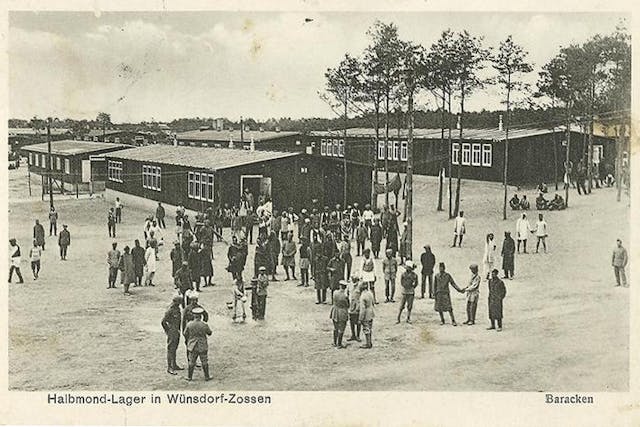
9. My grandfather was a Prisoner of War. How can I find out more about his experiences?
- Discover resources such as POW camp records, personal diaries, and oral histories to gain insights into your grandfather's experiences during captivity. Invaluable resources include the National Archives and Records Administration (NARA) for POW camp records and the Imperial War Museum (IWM) for personal diaries and oral histories. NARA holds extensive collections of military records, including documents related to prisoners of war, such as rosters and reports. Meanwhile, the IWM offers firsthand accounts through personal stories on their website, providing insights into wartime experiences, including capture and internment. Exploring these resources can help you gain a deeper understanding of your grandfather's wartime journey.
10. My grandfather was a GI with the US Forces in Britain. Where do I find his records?
- Access military service records through official archives like the National Archives and Records Administration (NARA) in the United States. Use their resources to locate your grandfather's service records.
11. My military ancestor died in service in WWI, where can I find out more about him?
- Explore websites such as the Commonwealth War Graves Commission (CWGC) and books/online datasets like the Soldiers Died in the Great War to research soldiers who perished during the First World War.
12. How do I use local newspapers to find out about the Home Guard in my home town?
- Use online and offline local newspaper archives to search for articles, advertisements, and reports related to the Home Guard's activities in your town during World War II. Visit SoG or your local library to find out more about accessing these resources.
Questions like these are answered all the time in our Armed Forces Advice Hour. Why not ask Graham Bandy your burning military questions there too?

Meet Graham
Graham Bandy is a former British Army Officer. Having spent 7 years with the Royal Anglian Regiment and later rejoining the British Army as a Nursing Officer, Graham has extensive military experience. More recently he has worked as a military medical historian/expert for the Yesterday TV series Instruments of Death demonstrating both Great War and Napoleonic military medicine and appeared on BBC's Who Do You Think You Are. He has also shared his expertise at many county and national family history fairs, such as WDYTYA Live and Family Tree Live. Graham also gives many talks and lectures on the subject of badge and photographic identification and sits on the Heritage Committee of the QARANC Association.
Join us
As a member, you can make the most of our resources, access our experts, and find a welcoming community of people interested in family history and genealogy.
We all have roots. Let’s find them together.
